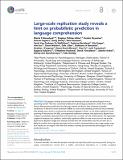Large-scale replication study reveals a limit on probabilistic prediction in language comprehension
Abstract
Do people routinely pre-activate the meaning and even the phonological form of upcoming words? The most acclaimed evidence for phonological prediction comes from a 2005 Nature Neuroscience publication by DeLong, Urbach and Kutas, who observed a graded modulation of electrical brain potentials (N400) to nouns and preceding articles by the probability that people use a word to continue the sentence fragment (‘cloze’). In our direct replication study spanning 9 laboratories (N=334), pre-registered replication-analyses and exploratory Bayes factor analyses successfully replicated the noun-results but, crucially, not the article-results. Pre-registered single-trial analyses also yielded a statistically significant effect for the nouns but not the articles. Exploratory Bayesian single-trial analyses showed that the article-effect may be non-zero but is likely far smaller than originally reported and too small to observe without very large sample sizes. Our results do not support the view that readers routinely pre-activate the phonological form of predictable words.
Citation
Nieuwland , M S , Politzer-Ahles , S , Heyselaar , E , Segaert , K , Darley , E , Kazanina , N , Von Grebmer Zu Wolfsthurn , S , Bartolozzi , F , Kogan , V , Ito , A , Mézière , D , Barr , D J , Rousselet , G A , Ferguson , H J , Busch-Moreno , S , Fu , X , Tuomainen , J , Kulakova , E , Husband , E M , Donaldson , D I , Kohút , Z , Rueschemeyer , S-A , Huettig , F & Shinn-Cunningham , B G (ed.) 2018 , ' Large-scale replication study reveals a limit on probabilistic prediction in language comprehension ' , eLife , vol. 7 , e33468 . https://doi.org/10.7554/eLife.33468
Publication
eLife
Status
Peer reviewed
ISSN
2050-084XType
Journal article
Rights
Copyright © 2018, Nieuwland et al. This article is distributed under the terms of the Creative Commons Attribution License, which permits unrestricted use and redistribution provided that the original author and source are credited.
Description
Funding: European Research Council ERC Starting grant 636458.Collections
Items in the St Andrews Research Repository are protected by copyright, with all rights reserved, unless otherwise indicated.

